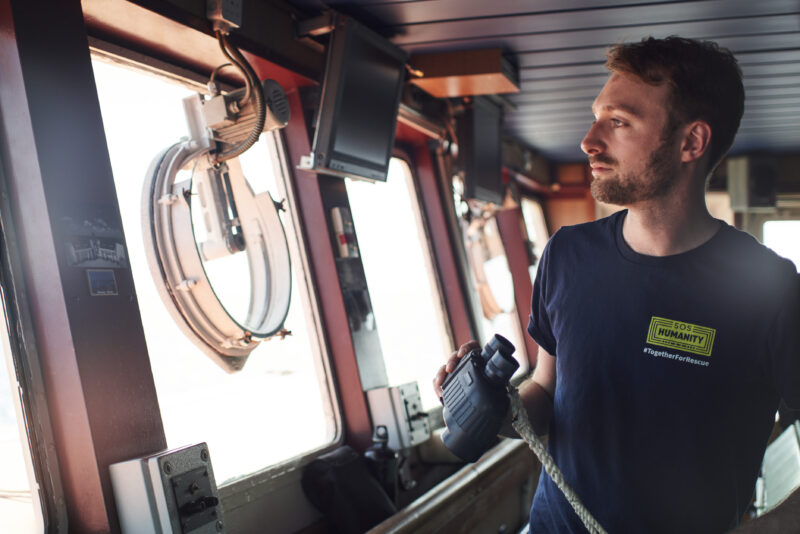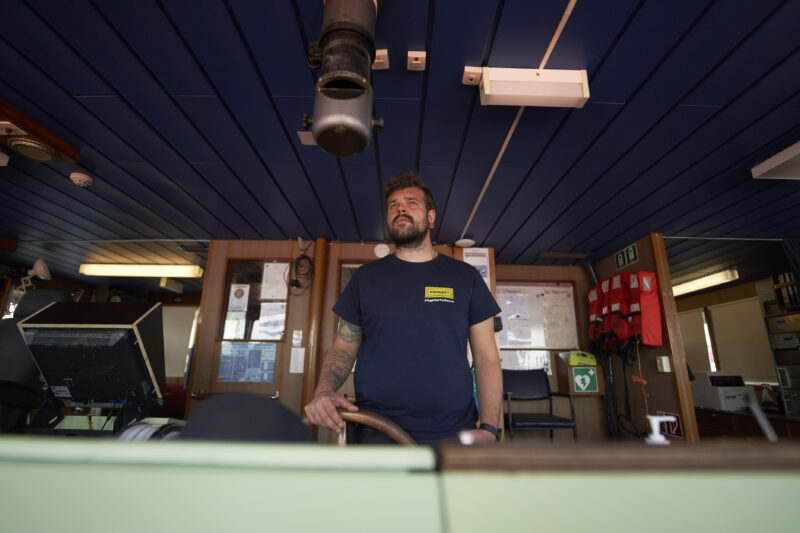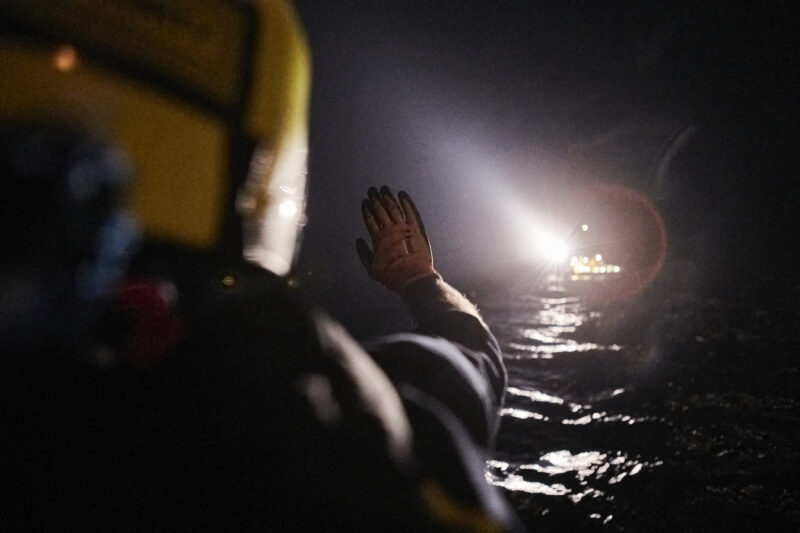“It was pure luck”: Communications Coordinator Sasha on lookouts on board

Sasha was on board Humanity 1 in 2023 as communications coordinator on the sixth rotation. In this interview, he tells us about difficult look-outs and life-threatening storms in the Mediterranean.
On the Mediterranean, squalls can descend quickly. We had just finished shuttling survivors from an unseaworthy metal boat to our rescue ship Humanity 1, the second of what would turn out to be nine rescues during our mission. Two survivors from the first rescue, whose condition had become critical, had been successfully evacuated for emergency medical care. Everything had gone smoothly.
And then the storm front arrived: pounding winds of gale force 10 (force 12 would be a hurricane), waves which battered our ship until we were forced to change course for our own safety. I was up on the bridge, which is kept pitch-black after sunset to aid with the lookout, with our captain, Josh. Josh was relieved that we’d arrived in the nick of time: “Anyone still out here now, in this weather, is dead.”

For once, he was wrong.
Often, distress cases reach the bridge of Humanity 1 via radio or email, sometimes reported by other NGOs like the emergency hotline Alarm Phone or Pilotes Volontaires. Yet this time, just minutes later, Josh spotted an irregular flashing light on the horizon. With the aid of one of the ship’s spotlights, the light quickly became a shape, and the shape became a cluster of people.
We had received no information about this distress case. It was pure luck that we had altered our course and spotted them. Immediately, Josh ordered our two speedboats, ‘Bravo’ and ‘Tango’, to be relaunched into the churning water.
Understandably, those on board were in a state of panic, a panic that can all too easily be deadly.
Many of those who flee Tunisia are originally from Francophone Africa. As one of the French speakers on board, I was instructed to shout at the top of my voice for them to stay calm – and stay seated – as the speedboats made their way through the storm.
Next, I tried to count the number of shapes in the boat through an infrared camera. I could see that it was listing to one side, little more than a hand’s breadth above sea level. When our speedboat Tango was close enough to assess the situation, and confirm that the boat had begun to take on water, a single sentence came over the radio: ‘We have a baby!’ In that moment, my heart stopped.

The rescue team began shuttling all 39 people to Humanity 1, starting with the one-year-old baby. Thankfully, the winds began to ease slightly. I watched the infrared figure of our Search & Rescue Coordinator, Rocco, pump his fists in celebration after the final person was pulled headlong onto the speedboat. Back on the mothership, several of the crew lay on deck, exhausted and in shock – but their exhaustion was nothing compared with those they had rescued.

I was called on deck to help translate. The first person I spoke to was a woman from Côte d’Ivoire who was physically unable to stand up. She told me she had been beaten with iron bars on her hips and legs in Tunisia. Lying in her arms, wide-eyed but quiet, was the calmest person on board Humanity 1 – and the youngest.
In a matter of hours, the sea, too, was completely calm again. Squalls can dissipate as quickly as they arrive.
In the early morning, two more boats in distress appeared on the horizon, and we were able to rescue both. With almost 200 survivors on board, we began the 1,300km journey to Ortona, the port of safety assigned by the Italian government. This practice of assigning unnecessarily distant ports contravenes international law. It is also particularly cruel on the survivors, who are forced to wait for several days on the crowded deck, with the European coastline visible, before disembarking and receiving the care they urgently need on land.
During these days, I was fortunate enough to speak with several survivors who wanted to tell their story. They recounted shocking experiences of violence, discrimination and modern-day slavery in Tunisia, many bearing physical and psychological scars. Another Ivorian woman rescued from the storm was travelling with her four-year-old daughter. She described the rescue in similar terms to our captain, from the opposite perspective:
As we neared Ortona, the Ivorian women began singing and dancing euphorically. They sang gospel songs celebrating life after death. Other survivors sat in silence, staring at the Mediterranean. We knew from conversations in the last few days that many were apprehensive about what awaited them in Europe. The experiences of our crew, the emotions, hard work and sleepless nights, were, after all, only a small part of the survivors’ journey, a journey which would continue long after they finally set foot on European soil.


